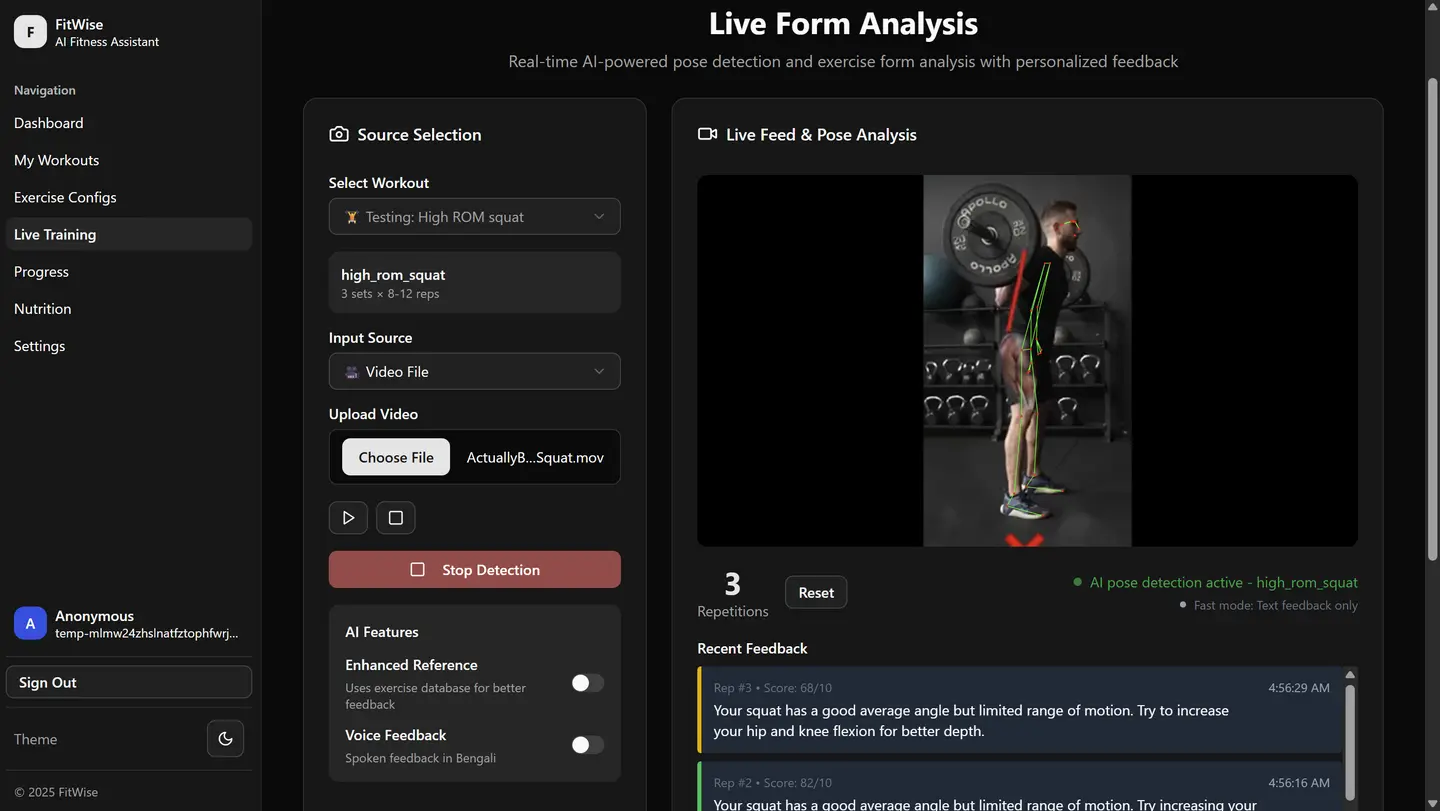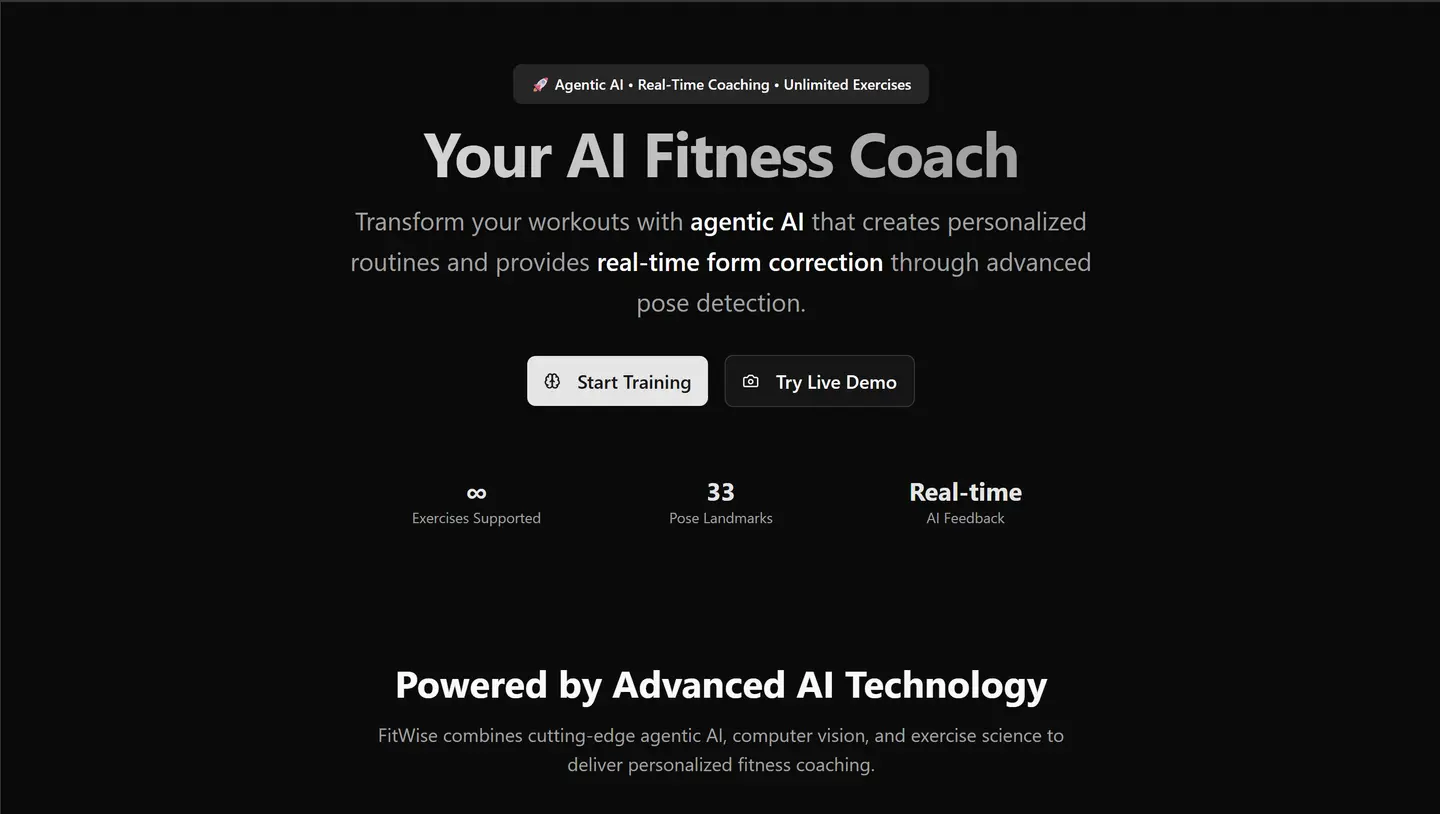FitWise 🏋️♂️🤖
FitWise is an intelligent AI-powered workout assistant that combines Agentic AI, RAG-enhanced knowledge, and MediaPipe pose detection to create personalized workout routines and provide real-time form correction — designed for fitness enthusiasts at every level.
🚀 Core Features
🧠 Agentic AI Workflow
- Intelligent Chat Assistant: Natural language conversation for fitness advice and workout creation
- Tool-Based Execution: Uses specialized tools for workout generation, exercise config creation, and data persistence
- Context-Aware Responses: Maintains conversation flow with multi-step reasoning
- User Session Management: Personalized experience with login/logout functionality
🎯 Dynamic Workout Generation
- Personalized Routines: AI creates workouts based on goals, equipment, experience level, and duration
- Unlimited Exercise Support: No longer limited to predefined exercises - AI generates tracking configs for any exercise
- Automatic Exercise Config Generation: MediaPipe pose tracking configurations created dynamically using LLM analysis
- Smart Caching: Efficient reuse of generated configurations for performance
- Database Integration: Saves workouts with linked exercise configurations for future use
📚 RAG-Enhanced Knowledge System
- Vector Database: Qdrant-powered embedding storage of exercise science research
- Relevance Filtering: Only uses high-relevance content (70%+ similarity) for responses
- Evidence-Based Recommendations: Leverages latest research in biomechanics, anatomy, and exercise science
- Source Citation: References specific research sources in responses
- LM Studio Integration: Local embedding generation using text-embedding models
📷 Advanced Pose Detection & Analysis
- MediaPipe Integration: Real-time pose landmark detection via webcam
- Multi-Joint Tracking: Composite angle analysis from multiple body joints
- Adaptive Peak Detection: Intelligent rep counting with trend analysis
- Target Angle Guidance: ROM (Range of Motion) optimization with personalized targets
- Bilateral Tracking: Left and right side angle measurements for balanced analysis
✅ Intelligent Real-Time Feedback
- AI-Powered Analysis: LLM-based feedback generation considering form, tempo, and ROM
- Configurable Performance Modes:
- Fast Mode: Quick text feedback for immediate responsiveness
- Enhanced Reference: RAG-enhanced feedback with research backing
- Voice Feedback: Spoken guidance in Bengali for hands-free operation
- Combined Mode: Both enhanced reference and voice for comprehensive feedback
- Scoring System: 0-100 performance scores with "good/okay/bad" classifications
- Progressive ROM Targets: Adjustable range of motion goals (Low/Standard/High/Maximum)
🛠️ User Interface & Experience
- Modern SvelteKit Frontend: Built with shadcn/ui components for a clean, responsive design
- Dashboard Overview: Centralized view of workouts, progress, and AI interactions
- Exercise Config Management: Visual interface for viewing and testing generated configurations
- Form Analysis Page: Real-time pose detection with visual feedback
- Workout Library: Save, organize, and access personalized workout routines
- Mobile-Responsive: Works seamlessly across desktop and mobile devices
🤖 Agentic AI Workflow
FitWise implements a sophisticated agentic AI system that orchestrates multiple tools and knowledge sources to provide comprehensive fitness assistance:
Agentic Components:
- Query Analysis Agent: Determines if queries are fitness-related and routes appropriately
- RAG Retrieval Agent: Searches vector database for relevant exercise science research
- Workout Generation Agent: Creates personalized routines using evidence-based principles
- Exercise Config Agent: Generates MediaPipe configurations for any exercise dynamically
- Persistence Agent: Manages user data, workout storage, and exercise configurations
- Feedback Agent: Provides real-time form analysis using pose detection data
�️ Tech Stack
Frontend & UI
- SvelteKit: Modern web framework with server-side rendering
- shadcn/ui: Beautiful, accessible component library built on Radix UI
- Tailwind CSS: Utility-first CSS framework for rapid styling
- TypeScript: Type-safe development with enhanced developer experience
AI & Machine Learning
- Vercel AI SDK: Agentic framework for tool-based AI interactions
- LM Studio: Local LLM inference for chat and embedding generation
- MediaPipe: Google's pose detection and landmark tracking
- OpenAI-Compatible API: Flexible model integration
Data & Storage
- PostgreSQL: Primary database via Prisma ORM
- Qdrant: Vector database for RAG embeddings
- Prisma: Type-safe database client and migration tool
- Better Auth: Secure authentication and session management
Infrastructure
- SvelteKit API Routes: Backend API endpoints
- Docker: Containerized Qdrant deployment
- pnpm: Fast, disk space efficient package manager
🔍 How It Works
Workout Creation Flow
- User Input → Express fitness goals, available equipment, and experience level
- AI Analysis → Agent analyzes requirements and queries RAG system for evidence-based recommendations
- Workout Generation → AI crafts personalized plan with exercises, sets, reps, and rest periods
- Exercise Config Creation → Automatically generates MediaPipe tracking configurations for each exercise
- Database Storage → Saves complete workout with linked exercise configurations
- Real-Time Tracking → Use saved workouts for live pose detection and form feedback
Real-Time Form Analysis
- Camera Activation → MediaPipe detects 33 body landmarks in real-time
- Angle Calculation → Multi-joint composite signals track movement patterns
- Rep Detection → Advanced peak/valley detection counts repetitions automatically
- AI Feedback → LLM analyzes form, tempo, and ROM providing instant corrections
- Voice Guidance → Optional spoken feedback in Bengali for hands-free operation
Dynamic Exercise Support
- Exercise Recognition → User mentions any exercise name
- Biomechanical Analysis → AI determines movement patterns, key joints, and muscle groups
- Config Generation → Creates MediaPipe tracking configuration automatically
- Caching → Stores configs for future use and performance optimization
📦 Installation & Setup
Prerequisites
- Node.js 18+ and pnpm
- Docker (for Qdrant vector database)
- LM Studio with compatible models
- Webcam for pose detection
1. Clone and Install
git clone https://github.com/WhyAsh5114/fit-wise
cd fit-wise
pnpm install
2. Database Setup
# Start Qdrant vector database
docker run -p 6333:6333 -v $(pwd)/qdrant_storage:/qdrant/storage qdrant/qdrant
# Set up PostgreSQL (update .env with your DATABASE_URL)
pnpm prisma migrate dev
3. LM Studio Configuration
- Install and start LM Studio
- Download required models:
- Chat Model:
qwen/qwen3-4bor similar instruction-following model - Embedding Model:
text-embedding-nomic-embed-text-v1.5orall-MiniLM-L6-v2
- Chat Model:
- Start the local server on
http://localhost:1234
4. Environment Variables
Create .env file:
DATABASE_URL="postgresql://user:password@localhost:5432/fitwise"
LM_STUDIO_URL="http://localhost:1234"
EMBEDDING_MODEL="text-embedding-nomic-embed-text-v1.5"
QDRANT_URL="http://localhost:6333"
BETTER_AUTH_SECRET="your-secret-key"
BETTER_AUTH_URL="http://localhost:5173"
5. Start Development
pnpm dev
⚠️ Requirements: Webcam access and modern browser for pose detection. Ensure LM Studio is running for AI features.
🎯 Key Features Demo
Chat-Based Workout Creation
User: "Create a upper body workout for intermediate level with dumbbells"
AI: *Uses createWorkout tool to generate personalized routine*
AI: "Would you like me to save this workout to your profile?"
User: "Yes"
AI: *Uses saveWorkout tool and generates exercise configs*
Dynamic Exercise Configuration
User: "Can you track tricep dips?"
AI: *Uses generateExerciseConfig tool*
AI: "Generated tracking configuration for tricep dips with elbow angle monitoring"
Real-Time Form Feedback
- Visual: Live pose landmarks with angle measurements
- Text: "Great range of motion! Control the tempo more." (Score: 82/100)
- Voice: Bengali audio feedback for hands-free guidance
- Classification: Good/Okay/Bad with specific improvement suggestions
🧩 Roadmap & Current Status
✅ Completed Features
- [x] Agentic AI chat interface with tool-based execution
- [x] Dynamic exercise configuration generation for unlimited exercise support
- [x] RAG-enhanced knowledge system with vector database
- [x] Real-time MediaPipe pose detection and rep counting
- [x] AI-powered form feedback with scoring system
- [x] Target angle guidance with progressive ROM settings
- [x] Workout creation, saving, and management
- [x] Exercise config caching and performance optimization
- [x] User authentication and session management
- [x] Modern responsive UI with SvelteKit and shadcn/ui
🚧 In Development
- [ ] Voice assistant guidance expansion (currently Bengali only)
- [ ] Mobile app with offline-first PWA capabilities
- [ ] Advanced workout analytics and progress tracking
- [ ] Social features and workout sharing
- [ ] Integration with health platforms (Apple Health, Google Fit)
🎯 Future Enhancements
- [ ] Computer vision-based equipment detection
- [ ] AI-powered injury prevention and recovery protocols
- [ ] Personalized nutrition recommendations
- [ ] Virtual reality workout environments
- [ ] Multi-language voice feedback support
- [ ] Professional trainer dashboard and client management
🚧 Challenges I Ran Into
Building FitWise presented several unique technical challenges that required innovative solutions:
MediaPipe Angle Data Preprocessing
Transforming raw MediaPipe pose landmarks into meaningful angle data for LLM consumption was more complex than anticipated. The challenge involved:
- Noisy Landmark Data: MediaPipe outputs can be jittery, requiring sophisticated smoothing algorithms
- Multi-Joint Coordination: Creating composite angle signals from multiple body joints while maintaining biomechanical accuracy
- Peak Detection Logic: Developing adaptive algorithms to detect rep peaks/valleys across different exercise patterns
- Angle Normalization: Ensuring angle data is consistent and interpretable for downstream LLM analysis
Solution: Implemented weighted composite angle calculations with moving average smoothing and adaptive peak detection that considers exercise-specific movement patterns.
Real-Time Model Streaming with Minimal Latency
Achieving fast response times while coordinating multiple AI models (LLM, RAG, TTS) proved challenging:
- RAG Pipeline Bottleneck: Vector search in Qdrant + embedding generation + LLM processing created latency spikes
- Streaming Conflicts: Balancing real-time pose feedback with chat-based AI responses
- Memory Management: Local models consuming significant RAM while maintaining smooth pose detection
- Tool Coordination: Managing sequential tool calls without blocking the UI
Solution: Implemented relevance thresholding (70%+) for RAG, aggressive caching of exercise configs, and background streaming with tool call optimization.
Quality Data Scraping for RAG Embeddings
Building a robust knowledge base from exercise science content required careful data curation:
- Content Quality: Filtering scientific articles from fitness blog spam and misinformation
- Source Diversity: Balancing peer-reviewed research with practical training insights
- Embedding Consistency: Ensuring local embedding models produce meaningful vector representations
- Data Structure: Organizing scraped content for optimal retrieval performance
Solution: Focused on reputable sources (RPStrength, research papers), implemented content validation, and used proven embedding models like all-MiniLM-L6-v2.
Local Model Quality vs. Speed Trade-offs
Running everything locally for privacy while maintaining performance created difficult compromises:
- Model Size Limitations: Smaller models (3B-4B parameters) vs. quality of larger cloud models
- Hardware Constraints: Balancing LLM inference, embedding generation, and MediaPipe processing on consumer hardware
- Response Quality: Local models sometimes producing less nuanced feedback compared to GPT-4 class models
- Context Length: Smaller models struggling with long conversation history and complex RAG context
Solution: Chose qwen3-4b for good instruction following, implemented smart context truncation, and optimized prompts for smaller model capabilities while maintaining acceptable quality.
� Documentation
- AI Feedback Setup: Configure Ollama and LM Studio for feedback
- Dynamic Exercise Config: Understanding the exercise generation system
- Target Angles Implementation: ROM guidance and target angle features
- Embedding Service: RAG system setup and content scraping
🤝 Contributing
We welcome contributions! Here's how you can help:
- Fork the repository
- Create a feature branch:
git checkout -b feature/amazing-feature - Commit changes:
git commit -m 'Add amazing feature' - Push to branch:
git push origin feature/amazing-feature - **Open a Pull Request`
Areas for Contribution
- Exercise science research integration
- New MediaPipe pose tracking configurations
- UI/UX improvements and accessibility
- Mobile app development
- Additional language support for voice feedback
- Performance optimizations
� License
FitWise is licensed under the MIT License. See LICENSE for details.
💬 Support & Community
- Issues: GitHub Issues
- Discussions: GitHub Discussions
- Email: For direct support and collaboration inquiries
🌟 Acknowledgments
- MediaPipe Team: For excellent pose detection technology
- Research Papers: Exercise science and biomechanics research powering our RAG system
- Open Source Community: SvelteKit, Prisma, Qdrant, and other amazing tools
- Fitness Community: Feedback and testing from real users and trainers
Built with ❤️ for the fitness community. Transform your workouts with AI-powered intelligence.
Transform your fitness journey with smart, real-time guidance — FitWise.



